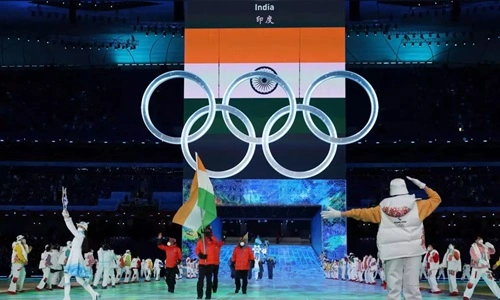India has officially announced its intention to bid for the 2036 Summer Olympics, with Ahmedabad positioned as the central hub in a proposed multi-city hosting model. This strategic plan aims to leverage the diverse infrastructure and cultural heritage across various Indian cities, enhancing the nation’s prospects of securing the prestigious event.
Ahmedabad: The Focal Point

Ahmedabad, the largest city in Gujarat, has been identified as the primary host city for India’s Olympic bid. The city’s selection is bolstered by significant investments in sports infrastructure, notably the development of the Sardar Vallabhbhai Patel Sports Enclave. This expansive complex is designed to accommodate a wide range of sporting events, aligning with international standards required for the Olympics.
The Narendra Modi Stadium, situated within the enclave, stands as a testament to Ahmedabad’s readiness. As the world’s largest cricket stadium with a seating capacity exceeding 132,000, it exemplifies the city’s capability to host large-scale international sporting events.
Multi-City Hosting Strategy
In addition to Ahmedabad, the Indian government is considering involving multiple cities to host various Olympic events. Cities such as Bhubaneswar, Bhopal, and Pune are under consideration, each offering unique facilities and cultural experiences. This decentralized approach aims to distribute the economic benefits and infrastructural development associated with the Olympics across different regions, fostering nationwide engagement.
Government’s Commitment and Vision
Prime Minister Narendra Modi has expressed unwavering support for the Olympic bid, describing it as an “age-old dream” for India. Addressing the International Olympic Committee (IOC) session in Mumbai, he stated, “India will leave no stone unturned in the preparation for the successful organisation of the Olympics in 2036 – this is the dream of the 140 crore [1.4 billion] Indians.”
Union Home Minister Amit Shah has also highlighted the government’s dedication, noting substantial financial allocations for sports complexes in Ahmedabad. He emphasized that these facilities are being developed with the potential to host the Olympics, reflecting the strategic planning underpinning India’s bid.
Preparatory Measures and International Collaboration
To ensure the bid’s success, Indian officials are engaging in comprehensive preparatory activities. Delegations from Ahmedabad have visited cities like Paris to study the infrastructure and organizational aspects of hosting the Olympics. These visits aim to glean insights from previous hosts, ensuring that India’s plans align with global best practices.
Challenges and Considerations
While the bid reflects India’s aspirations, it also presents challenges. The multi-city hosting model requires seamless coordination among various state governments and agencies. Additionally, substantial investments in infrastructure, security, and logistics are imperative to meet the rigorous standards set by the IOC.
Critics have pointed out potential issues, such as the need for sustainable development and the risk of underutilized infrastructure post-Olympics. Addressing these concerns through meticulous planning and community engagement will be crucial for the bid’s success.
Conclusion
India’s bid for the 2036 Olympics, with Ahmedabad at its core and a multi-city hosting strategy, signifies a monumental step in the nation’s sporting and cultural journey. The proposal not only aims to bring the world’s most prestigious sporting event to Indian soil but also seeks to catalyze infrastructural development and promote unity through sports.
As the IOC evaluates the bids, India’s comprehensive approach and governmental commitment position it as a formidable contender to host the 2036 Summer Olympics.